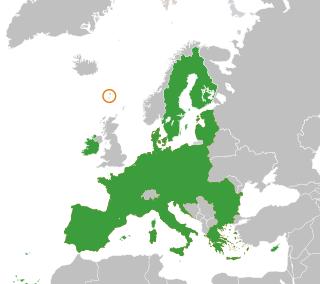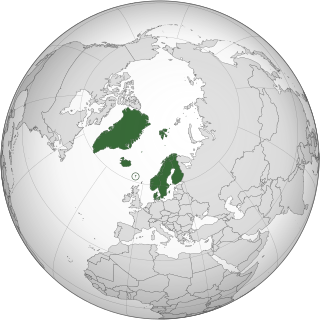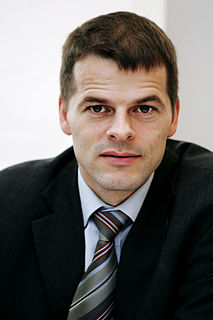The politics of the Faroe Islands a "constituent country" of the Kingdom of Denmark, function within the framework of a parliamentary representative democratic dependency, whereby the Prime Minister of the Faroe Islands is the head of government, and of a multi-party system. The Faroe Islands are politically associated with the Kingdom of Denmark, but have been self-governing since 1948. Executive power is exercised by the government. Legislative power is vested in both the government and the Løgting. The judiciary is independent of the executive and the legislature and the responsibility of Denmark. As of October 25, 2007, the Faroe Islands became one electoral district.

Tórshavn is the capital and largest town of the Faroe Islands. Tórshavn is in the southern part on the east coast of Streymoy. To the northwest of the city lies the 347-meter-high (1,138 ft) mountain Húsareyn, and to the southwest, the 350-meter-high (1,150 ft) Kirkjubøreyn. They are separated by the Sandá River. The town proper has a population of 13,089 (2017), and the greater urban area a population of 21,000.
The króna is the currency of the Faroe Islands. It is issued by Danmarks Nationalbank , the central bank of Denmark. It is not an independent currency but a version of the Danish krone. Consequently, it does not have an ISO 4217 currency code and instead shares that of the Danish krone, DKK. The króna is subdivided into 100 oyru(r).

The British occupation of the Faroe Islands in World War II, also known as Operation Valentine, was implemented immediately following the German invasion of Denmark and Norway. It was a small component of the roles of Nordic countries in World War II.

Lesbian, gay, bisexual, and transgender (LGBT) rights in the Faroe Islands are relatively similar to that of Denmark. The progress of LGBT rights has been slower, however. While same-sex sexual activity has been legal in the Faroe Islands since the 1930s, same-sex couples never had a right to a registered partnership. In April 2016, the Løgting passed legislation legalizing civil same-sex marriage on the Faroes, recognizing same-sex marriages established in Denmark and abroad and allowing same-sex adoption. This was ratified by the Folketing in April 2017. The law went into effect on 1 July 2017.

The term "the unity of the Realm" refers to the relationship between Denmark proper, the Faroe Islands and Greenland—three countries constituting the Kingdom of Denmark.
Joen Pauli Højgaard Ellefsen was a Faroese politician and member of the Union Party. He was Prime Minister of the Faroe Islands from 1981 to 1985.

The Faroe Islands, a self-governing nation within the Kingdom of Denmark, is not part of the EU, as explicitly asserted by both Rome treaties.

Iceland–Norway relations are foreign relations between Iceland and Norway. Iceland has an embassy in Oslo and Norway has an embassy in Reykjavík.

The Nordic countries or the Nordics are a geographical and cultural region in Northern Europe and the North Atlantic, where they are most commonly known as Norden. The term includes Denmark, Finland, Iceland, Norway, and Sweden, as well as Greenland and the Faroe Islands—which are both part of the Kingdom of Denmark—and the Åland Islands and Svalbard and Jan Mayen archipelagos that belong to Finland and Norway respectively, whereas the Norwegian Antarctic territories are often not considered a part of the Nordic countries, due to their geographical location. Scandinavians, who comprise over three quarters of the region's population, are the largest group, followed by Finns, who comprise the majority in Finland; other groups are indigenous minorities such as the Greenlandic Inuit and the Sami people, and recent immigrants and their descendants. The native languages Swedish, Danish, Norwegian, Icelandic, and Faroese are all North Germanic languages rooted in Old Norse. Native non-Germanic languages are Finnish, Greenlandic and several Sami languages. The main religion is Lutheran Christianity. The Nordic countries have much in common in their way of life, history, religion, their use of Scandinavian languages and social structure. The Nordic countries have a long history of political unions and other close relations, but do not form a separate entity today. The Scandinavist movement sought to unite Denmark, Norway and Sweden into one country in the 19th century, with the indepedence of Finland in the early 20th century, and Iceland in the mid 20th century, this movement expanded into the modern organised Nordic cooperation which includes the Nordic Council and the Nordic Council of Ministers. Especially in English, Scandinavia is sometimes used as a synonym for the Nordic countries, but that term more properly refers to the three monarchies of Denmark, Norway and Sweden. Geologically, the Scandinavian Peninsula comprises the mainland of Norway and Sweden as well as the northernmost part of Finland.

Arctic cooperation and politics are partially coordinated via the Arctic Council, composed of the eight Arctic nations: the United States of America, Canada, Iceland, Norway, Sweden, Finland, Russia, and Denmark with Greenland and the Faroe Islands. The dominant governmental power in Arctic policy resides within the executive offices, legislative bodies, and implementing agencies of the eight Arctic nations, and to a lesser extent other nations, such as United Kingdom, Germany, European Union and China. NGOs and Academia play a large part in Arctic policy. Also important are intergovernmental bodies such as the United Nations and NATO.
The Arctic Policy of the Kingdom of Denmark defines Denmark's]] foreign relations and policies with other Arctic countries, and Denmark's]] Strategy for the Arctic on issues occurring within the geographic boundaries of "the Arctic" or related to the Arctic or its peoples. The Kingdom of Denmark is an Arctic nation with the importance of the Unity of the Realm with Denmark in Europe and the self-governing countries Greenland in the Arctic and the Faroe Islands in the North Atlantic.

The Faroese independence movement or the Faroese national movement is a political movement which seeks the establishment of the Faroe Islands as a sovereign state outside Denmark. Reasons for complete autonomy include the linguistic and cultural divide between Denmark and the Faroe Islands as well as their lack of proximity to one another; the Faroe Islands are about 990 km from Danish shores.

Bárður á Steig Nielsen is a Faroese politician and businessman. He has been the leader of the Union Party since 24 October 2015. He is also goalkeeper of the VÍF handball team and a former handball player of the Faroe Islands national team.

Bjørt Samuelsen is a Faroese journalist, specialist in food science and politician (Republic).

















